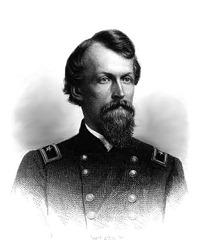September 23.—Three hundred Sioux Indians, under Little Crow, attacked Colonel Sibley’s command near Yellow Medicine, Minn. The battle lasted two hours, resulting in the repulse of the Indians with the loss of thirty killed and a large number wounded. Four whites were killed and from thirty to forty wounded.—(Doc. 209.)
—This being the last day for taking the oath of allegiance, at New-Orleans, La., in accordance with the order of Gen. Butler, the City Hall and Custom House in that city were besieged by thousands, desirous of availing themselves of the privilege.—The schooner Nellie was captured by the United States steamer Alabama.
—This morning the town of Sutton, Va., was attacked by a body of about one hundred rebel cavalry, but were repulsed by the Union force guarding the post, under Major Withers, Tenth Virginia, and driven nine miles, when, the rebels being reenforced, the Unionists retired, but being in their turn pursued, and being greatly outnumbered, they abandoned their position and fell back to Bulltown.— Wheeling Intelligencer.
—Colonel Switzer, Sixty-second Pennsylvania, in command of his own regiment, with a section of the First New-York artillery, and Griffin’s brigade, crossed the Potomac from Maryland into Virginia at Reynolds’s Ford, below Shepherdstown, Va., and captured over four hundred rifles, mostly marked “London, 1862,” and a twelve-pounder rifled brass cannon of English manufacture. The capture was accomplished without firing a shot; the rebel pickets falling back as the Union men advanced.
—The One Hundred and Forty-ninth (Fourth Onondaga) regiment, nine hundred strong, commanded by Col. Henry A. Barnum, left Syracuse for Washington at nine o’clock this morning. They went by way of Geneva, Elmira and Harrisburgh through Baltimore. Col. Barnum was not able to go with the regiment further than Elmira, not having fully recovered from his wound received on the Virginia Peninsula.
—Major-General Wright, in a special order issued at Cincinnati, Ohio, declared that the daily prohibition of business after four P.M. was rescinded. On every Saturday, after two P.M., business of every kind was to be suspended until five P.M., during which interval all able-bodied men in Cincinnati, Covington, and Newport were to meet for drill. Passes to citizens, except to enter the military lines, and passes issued under the orders regarding the drafting of the enrolled militia, were dispensed with. In dispensing with the daily drills and suspension of business, the General Commanding had in view the relief, as far as was practicable, of the people from burdens to which they had not been accustomed, but would impress upon the minds of all the fact that danger had not passed away; that the present military organization must be rigidly adhered to and carefully preserved. He thanked the citizens for the general alacrity with which they sprung to arms and entered upon the labor for the common defence, and the patience with which they had borne the various restrictions imposed upon them.
—Governor Curtin, of Pennsylvania, issued an order returning thanks to the people of that State for the manner in which they responded to his call for fifty thousand volunteers to resist invasion.—The National War Committee of the city of New-York held a special meeting, at which the sub-committee submitted an addendum to their report of the fifth instant, having relation to their conference with the Governors of the New-England States, concerning the adoption of measures to hasten forward troops to the seat of war.
—Yesterday the steamer Eugene, plying between Cairo and Memphis on the Mississippi River, carrying the United States mail and a large number of passengers and troops, was attacked at Randolph, Tenn., by a band of rebel guerrillas, but she got off. This, on the arrival of the boat at Memphis, being reported to General Sherman, commanding the Union forces there, he despatched, in the steamers Ohio Belle, and Eugene, a force of troops who to-day burned the town.—Cincinnati Commercial.
—The day on which the draft was to take place in Pennsylvania was postponed to the sixteenth October.
—The steamer Emma was boarded at Foster’s Landing, on the Ohio River, by a party of rebel guerrillas, who, after plundering her of all they wanted, allowed her to proceed.



